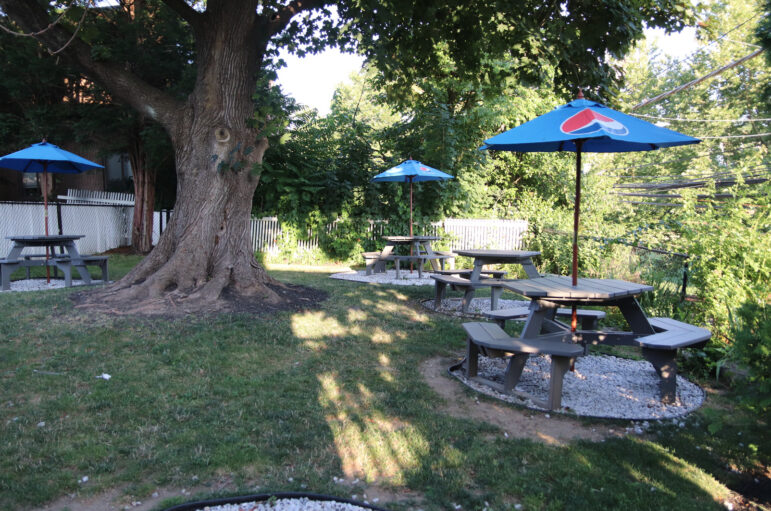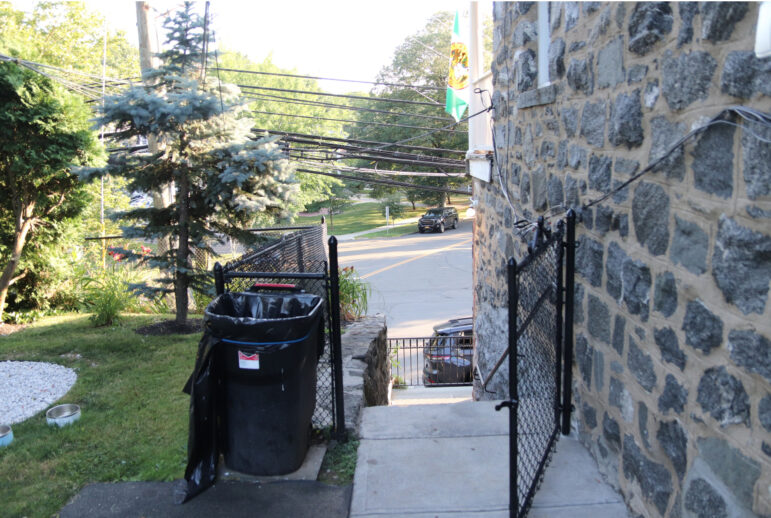An application for outdoor dining for six tables for six, plus an ADA table for two (38 in total), in addition to 31 indoor seats at Glenville Pizza came before P&Z at the most recent meeting.
The eatery, which is in the basement of a house at 243 Glenville Street, and only has two striped parking spaces out front, was in receipt of a zoning violation for their outdoor dining.
The timing of the application is interesting, given P&Z is studying outdoor dining and considering what to make permanent.
During the pandemic there were Executive Orders liberalizing outdoor dining.
The relaxed rules were created by Governor Lamont in early 2020 through an Executive Order he issued using his emergency authority as a way of increasing the ability of restaurants to serve their customers more safely by expanding their outdoor footprints.
Following that, HB 5271 allowed the relaxed rules on outdoor dining to continue for an additional year, running through March 2023.
P&Z chair Margarita Alban said that nearly doubling the pizza parlor’s seating capacity would exacerbate an already dangerous parking situation.


In addition to the deficient parking, there were questions about ADA access.
Representing the applicant was Eric Brower, who said there were two ADA spots at the end of a driveway, up the hill behind the building, and that if someone needed ADA access to the outdoor seating, they could park there, and access the table for two just inside the gate to the outdoor dining area. But, he said the person would need a member of their party to go down the stairs to the pizza parlor to get the food.
Mr. Brower, said the commission had no power under HB 5271 for the P&Z to impose conditions on outdoor dining at Glenville Pizza.
P&Z chair Margarita Alban disagreed.
The commission cited language in HB 5271:
“…any person permitted to engage in outdoor activities may engage in such activities (1) on public sidewalks and other pedestrian pathways abutting the area permitted for principal use and on which vehicular access is not allowed, (A) provided a pathway (i) is constructed and maintained in compliance with physical accessibility guidelines, as applicable, under the federal Americans with Disabilities Act,…
…and (B) subject to reasonable conditions imposed by the municipal official or agency that issues right-of-way or obstruction permits, (2) on off-street parking spaces or parking lots associated with the permitted use, notwithstanding any municipal ordinance establishing minimum requirements for off-street parking.” (bold added for emphasis).
The chair noted that parking at the eatery was already severely deficient, and contrary to promises in the application, there was already amplified music and beer served.
Alban cited HB 5271’s reference to the ability of the municipal agency responsible to set “reasonable conditions.”
She said she’d visited the eatery and seen multiple cars parked on the sidewalk, which is on a sharp curve along Glenville Road.
“You are creating holy hell on the street,” Alban said.
“What I suggest is we require that they close their indoor seats,” Alban said. “From what I can tell, nobody sits inside anyway – it’s basically a takeout space…They have offered to allow no alcoholic beverage consumption. …And no amplified music outdoors.”
Mr. Brower said the application was made on June 29 under House Bill 5271, and that after he received approvals from the Health Dept, Building Dept and Fire Marshal, he then received a copy of the P&Z staff report suggesting that local regulations were being applied with respect to parking, and argued that was inconsistent with HB 5271.
He said it was unfair of the commission to cite deficient parking, and that nothing in 5271 required the applicant to submit an application.
“Mr. Brower, you are always going to have non conforming parking at this site,” Alban said. “Your tables indoors are empty. What is the problem here? You are adding 38 seats.”
Brower replied, “The law says clearly that this law is to be interpreted liberally to ensure the continuance of outdoor dining under these circumstances.”
He added, “Any interpretation of this law requiring us to remove tables is absolutely in violation of this statute.”
Ms Alban offered a compromise.
“You can just put signs on (the indoor tables) that they are not to be used when the outdoor dining is open. How hard is that?” she asked.
Also, Alban noted, “You represented that you were not serving alcohol, but beer was being served.”
Mr. Brower said the alcohol wasn’t served outdoors but customers might carried their alcohol outside. “So we have an enforcement issue.”
“Number three, you had amplified music,” she added.
“Even during the EO’s that was not permitted,” Alban said. “Figure out a way to reduce indoor seating when outdoor seating is being used. How hard is that? Just don’t make a mess of the street.”
Mr. Brower said the parking deficiency would continue regardless of the outdoor dining situation.
“Don’t make it worse,” Alban said.
“It was made clear to the public in adopting this reg that parking and other requirements were not going to be enforced,” Brower responded.
Again, Alban said HB 5271 clearly states the commission can make “reasonable conditions” and that would apply to the obstruction of the street.
“There were cars parked, piled up on the curb when I was there,” she added.
“The adoption of your local regulation was specifically cited to be in compliance with the house bill. For us now to be in a position, as a result of filing for the site plan, we are being regulated for parking deficiencies,” Brower said. “That clearly is not part of what the house bill states.”
“I was told I had to apply for a site plan because the project had not been previously approved by the commission,” he added. “The problem with that is there is nothing in the HB requiring one to do that.”
He said, for this 2022 season only, his client’s outdoor dining did not have to comply with local zoning regulations, per HB 5271.
“The law says clearly in another subsection that this law is to be applied liberally to ensure the continuance of outdoor dining,” Brower said.
Brower noted there was an appeal process, per HB 5271.
“If you would like us to deny you, and you take us to court, you go right ahead,” Alban said.
“I don’t need your approval for this. I followed your regulations,” Brower said.
“Well then, we will take you to court because we’re trying to impose a perfectly legal condition on your use,” Ms Alban said.
Ms Alban asked if Mr. Brower was amendable to closing off indoor seating when outdoor seating was in use. He said he’d check with his client.
The application was left open and will be on the agenda for the August P&Z meeting.